The gifts of the Holy Spirit

In a previous post , Michael Morrison, Grace Communion Seminary professor and dean of students, addressed the work of the Holy Spirit. In this post he addresses the work the Spirit does in equipping believers with particular "gifts of the Spirit." This post excerpts a lecture on this topic by Dr. Morrison. Pentecost by Jean Restout (public domain via Wikimedia Commons) One of the ways the Holy Spirit works in individuals and within the community as a whole is by giving "gifts of the Spirit" to members of the church for the benefit of the church. We find the fullest explanation of this in the apostle Paul’s letter to the church at Corinth, a community of believers that needed instruction concerning the Holy Spirit and church unity. Paul writes this: Now about the gifts of the Spirit, brothers and sisters, I do not want you to be uninformed. (1 Cor. 12:1) Paul then comments on how God works in different ways in different people: There are different kinds...





